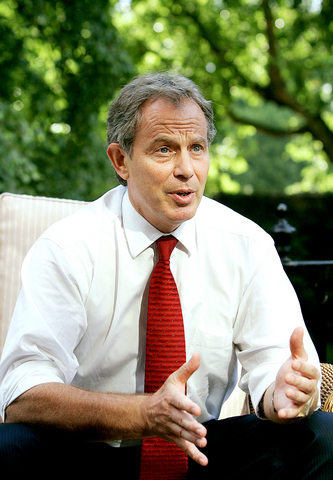British Prime Minister Tony Blair firmly denied that the Bush administration signaled just months after Sept. 11 that a decision was made to invade Iraq, saying he was "astonished" by claims that leaked secret memos suggested the US was rushing to war.
In an interview a day after US President George W. Bush delivered a televised defense of the war in Iraq, Blair said defeating the insurgency was crucial to protecting security worldwide, and joined Bush in linking the war with the Sept. 11, 2001, attacks.
"What happened for me after Sept. 11 is that the balance of risk changed," said Blair, interviewed on the stone terrace overlooking the garden of his No. 10 Downing Street offices, where policy meetings on Iraq were held before the invasion.

PHOTO: AP
After Sept. 11, it was necessary to "draw a line in the sand here, and the country to do it with was Iraq because they were in breach of UN resolutions going back over many years," he said. "I took the view that if these people ever got hold of nuclear, chemical or biological capability, they would probably use it."
Blair was asked about the leaked memos, which suggest strong concerns in the British government that the Bush administration was determined in 2002 to invade Iraq -- months before the US and Britain unsuccessfully sought UN Security Council approval for military action.
"People say the decision was already taken. The decision was not already taken." Blair said he was "a bit astonished" at the intensive US media coverage about the memos, which included minutes of a July 23, 2002, meeting between Blair and top officials at his Downing Street office.
According to the minutes of the meeting, Sir Richard Dearlove, then chief of Britain's intelligence service, said the White House viewed military action against then Iraqi president Saddam Hussein as inevitable following the Sept. 11 attacks.
Bush "wanted to remove Saddam, through military action, justified by the conjunction of terrorism and WMD" (weapons of mass destruction), read the memo. "But the intelligence and facts were being fixed around the policy."
In the interview, Blair said raising such concerns was a natural part of any examination of the cause for war.
"The trouble with having a political discussion on the basis of things that are leaked is that they are always taken right out of context. Everything else is omitted from the discussion and you end up focusing on a specific document," he said. "It would be absolutely weird if, when the Iraq issue was on the agenda, you were not constantly raising issues, trying to work them out, get them in the right place," he said.
Blair suggested that ensuring victory in Iraq was now more important than debating the case for invasion.
"The most important thing we can do in Iraq is concentrate on the fact ... that what is happening there is a monumental battle that affects our own security," he said. "You've got every bad element in the whole of the Middle East in Iraq trying to stop that country [from getting] on its feet and [becoming] a democracy."
Blair echoed Bush's pledge on Tuesday to keep US forces in Iraq until the fight is won.
"There is only one side to be on now and it is time we got on it and stuck in there and get the job done, and not leave until the job is done," he said.
While Blair's close ties to Bush have cost him with voters at home, he said it's that relationship which allows the countries to talk about tough issues.
"My support for America is not based on you give us support for this and you get that in return," Blair said. "I should only do what is right for Britain. The president should only do what is right for America, and we should both try to do what is right for the world."
That alluded to Blair's ambitious twin goals for next week's G8 summit in Scotland -- reaching consensus on fighting climate change, and greatly boosting aid to Africa. On climate change in particular, Blair said the going may be rough.
"On climate change there obviously has been a disagreement over Kyoto" Blair said referring to the Kyoto Protocol, which the Bush administration has rejected.
He said he hoped to reach agreement on moving toward a low-carbon economy that curbs greenhouse gas emissions.
"On Africa, I don't think there is a disagreement about the basic principles of what we are trying to achieve and obviously I hope that by the time we get to the summit next week we have got agreement on the substance of the package," he said.

MONEY GRAB: People were rushing to collect bills scattered on the ground after the plane transporting money crashed, which an official said hindered rescue efforts A cargo plane carrying money on Friday crashed near Bolivia’s capital, damaging about a dozen vehicles on highway, scattering bills on the ground and leaving at least 15 people dead and others injured, an official said. Bolivian Minister of Defense Marcelo Salinas said the Hercules C-130 plane was transporting newly printed Bolivian currency when it “landed and veered off the runway” at an airport in El Alto, a city adjacent to La Paz, before ending up in a nearby field. Firefighters managed to put out the flames that engulfed the aircraft. Fire chief Pavel Tovar said at least 15 people died, but

LIKE FATHER, LIKE DAUGHTER: By showing Ju-ae’s ability to handle a weapon, the photos ‘suggest she is indeed receiving training as a successor,’ an academic said North Korea on Saturday released a rare image of leader Kim Jong-un’s teenage daughter firing a rifle at a shooting range, adding to speculation that she is being groomed as his successor. Kim’s daughter, Ju-ae, has long been seen as the next in line to rule the secretive, nuclear-armed state, and took part in a string of recent high-profile outings, including last week’s military parade marking the closing stages of North Korea’s key party congress. Pyongyang’s official Korean Central News Agency (KCNA) released a photo of Ju-ae shooting a rifle at an outdoor shooting range, peering through a rifle scope

South Korea would soon no longer be one of the few countries where Google Maps does not work properly, after its security-conscious government reversed a two-decade stance to approve the export of high-precision map data to overseas servers. The approval was made “on the condition that strict security requirements are met,” the South Korean Ministry of Land, Infrastructure and Transport said. Those conditions include blurring military and other sensitive security-related facilities, as well as restricting longitude and latitude coordinates for South Korean territory on products such as Google Maps and Google Earth, it said. The decision is expected to hurt Naver and Kakao

Gaza is rapidly running out of its limited fuel supply and stocks of food staples might become tight, officials said, after Israel blocked the entry of fuel and goods into the war-shattered territory, citing fighting with Iran. The Israeli military closed all Gaza border crossings on Saturday after announcing airstrikes on Iran carried out jointly with the US. Israeli authorities late on Monday night said that they would reopen the Kerem Shalom crossing from Israel to Gaza yesterday, for “gradual entry of humanitarian aid” into the strip, without saying how much. Israeli authorities previously said the crossings could not be operated safely during